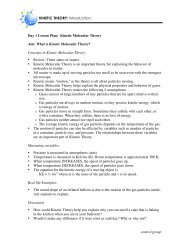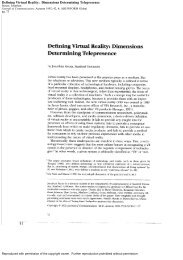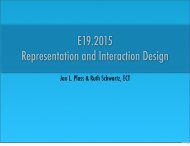Evaluating and managing cognitive load in educational games
Evaluating and managing cognitive load in educational games
Evaluating and managing cognitive load in educational games
Create successful ePaper yourself
Turn your PDF publications into a flip-book with our unique Google optimized e-Paper software.
<strong>Evaluat<strong>in</strong>g</strong> <strong>and</strong> Manag<strong>in</strong>g Cognitive Load <strong>in</strong> Games<br />
EMPIrIcAL stUDIEs OF<br />
cOGNItIVE LOAD FActOrs IN<br />
EDUcAtIONAL GAMING<br />
APPLIcAtIONs<br />
As was mentioned <strong>in</strong> the <strong>in</strong>troduction, direct studies<br />
of <strong>cognitive</strong> <strong>load</strong> effects <strong>in</strong> game-based learn<strong>in</strong>g<br />
environments are extremely rare <strong>and</strong> mostly<br />
limited to the role of <strong>in</strong>structional guidance as an<br />
important factor <strong>in</strong> reduc<strong>in</strong>g high-<strong>load</strong> situations.<br />
Provid<strong>in</strong>g sufficient levels of <strong>in</strong>structional guidance<br />
<strong>and</strong> support for learners is an important means of<br />
reduc<strong>in</strong>g extraneous <strong>cognitive</strong> <strong>load</strong> <strong>and</strong> improv<strong>in</strong>g<br />
learn<strong>in</strong>g-effective engagement <strong>in</strong> <strong>in</strong>teractive<br />
gam<strong>in</strong>g environments. Just provid<strong>in</strong>g learners with<br />
higher levels of control that allow them to potentially<br />
access additional assistance (e.g., h<strong>in</strong>ts) may not<br />
be sufficient. For example, it was established that<br />
many learners <strong>in</strong> virtual environments simply did<br />
not use the available h<strong>in</strong>t system (e.g., Nelson, 2007;<br />
Nelson, Ketelhut, Clarke, & Dieterle, <strong>in</strong> press).<br />
Moreno <strong>and</strong> Duran (2004) <strong>in</strong>vestigated benefits<br />
of guidance <strong>in</strong> discovery multimedia game- based<br />
learn<strong>in</strong>g environments <strong>in</strong> elementary school mathematics.<br />
Two representations of the arithmetic<br />
procedures were used for addition <strong>and</strong> subtraction<br />
problems: a traditional symbolic representation of<br />
the number sentence <strong>and</strong> a visual representation.<br />
The visual representation used a number l<strong>in</strong>e <strong>and</strong><br />
an animated bunny mov<strong>in</strong>g along the l<strong>in</strong>e accord<strong>in</strong>g<br />
to the number operations performed (fac<strong>in</strong>g the<br />
left or right sides of the screen if the correspond<strong>in</strong>g<br />
numbers have the m<strong>in</strong>us or plus signs). If learners<br />
answered a problem correctly, they could see an<br />
animated sequence demonstrat<strong>in</strong>g major steps <strong>in</strong><br />
solv<strong>in</strong>g the problem. In the guided group, the learners<br />
also could hear explanations for each step of the<br />
animation. It was assumed that comb<strong>in</strong><strong>in</strong>g symbolic<br />
<strong>and</strong> visual representations could help learners<br />
(especially less knowledgeable novice learners)<br />
to build connections between formal procedures<br />
<strong>and</strong> their <strong>in</strong>formal <strong>in</strong>tuitive conceptual knowledge<br />
(mov<strong>in</strong>g along a path). The results demonstrated<br />
that learn<strong>in</strong>g new mathematical procedures could<br />
be overwhelm<strong>in</strong>g for novice learners when no<br />
guidance is provided. The verbal guidance is an<br />
important means to enhance learn<strong>in</strong>g <strong>in</strong> gamebased<br />
multimedia environments us<strong>in</strong>g multiple<br />
representations.<br />
Another important result of this study was that<br />
students’ lower computer proficiency could underm<strong>in</strong>e<br />
the potential benefits of learn<strong>in</strong>g <strong>in</strong> gamebased<br />
environments: high-computer experience<br />
learners, especially those with verbal guidance,<br />
outperformed low-experience learners <strong>in</strong> similar<br />
conditions (see also Clarke, Ayres, & Sweller, 2005,<br />
for a similar conclusion based on studies of learn<strong>in</strong>g<br />
mathematics us<strong>in</strong>g spreadsheet applications).<br />
High <strong>cognitive</strong> dem<strong>and</strong>s of familiarization with<br />
gam<strong>in</strong>g hardware <strong>and</strong> correspond<strong>in</strong>g functional<br />
procedures may leave no <strong>cognitive</strong> resources available<br />
for acquisition of mean<strong>in</strong>gful doma<strong>in</strong>-specific<br />
knowledge structures. A practical implication of<br />
this result is that, from a <strong>cognitive</strong> <strong>load</strong> po<strong>in</strong>t of<br />
view, it is important to br<strong>in</strong>g students to a sufficiently<br />
high level of computer proficiency prior to<br />
<strong>in</strong>volv<strong>in</strong>g them <strong>in</strong> explor<strong>in</strong>g complex <strong>in</strong>teractive<br />
environments.<br />
The <strong>in</strong>structional effectiveness of <strong>games</strong> could<br />
be low (especially for learners with low levels of<br />
prior knowledge) if no sufficient <strong>in</strong>structional support<br />
is provided <strong>and</strong> students are <strong>in</strong>volved <strong>in</strong> pure<br />
discovery learn<strong>in</strong>g. A discovery-based computer<br />
game may have positive learn<strong>in</strong>g effects only<br />
when students have sufficient <strong>cognitive</strong> resources<br />
to process multiple representations <strong>and</strong> sources of<br />
<strong>in</strong>formation <strong>in</strong> work<strong>in</strong>g memory. Such resources<br />
can only be available if the learners have good<br />
prior familiarity with the correspond<strong>in</strong>g knowledge<br />
doma<strong>in</strong>. Mayer, Mautone, <strong>and</strong> Prothero (2002)<br />
demonstrated that students learned better from a<br />
geology game when they received explicit guidance<br />
about how to visualize geological structures.<br />
Moreno (2004) found that students benefited more<br />
from explanatory rather than merely corrective<br />
feedback <strong>in</strong> a multimedia game about environmental<br />
problems.<br />
727








